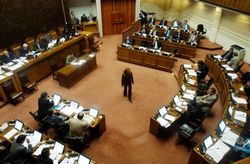Making Easier Trade with Cuba
- Submitted by: admin
- International
- United States
- Business and Economy
- 07 / 20 / 2009

The Senate Appropriations Committee July 9 approved a provision by Sen. Byron Dorgan, D-N.D., that would make it easier for Cuba to pay for the agricultural products it buys from the United States.
The measure, which was an amendment added to the fiscal year 2010 Financial Services Appropriations bill, would require the Treasury Department to return to a system of requiring Cuba to pay for foodstuffs before they arrive in Cuba, rather than before they leave the United States. The bill still has to go to the Senate floor and later would have to be paired with a similar measure in the House.
Dorgan noted to his fellow appropriators that the Treasury Department initially had allowed Cuba to follow the normal commercial pattern of making payment before goods arrive in a country, but that in 2005, the Bush administration decided that “cash in advance” meant payment for the goods before they left the country. The fiscal year 2009 omnibus appropriations bill included language requiring Treasury to go back to the earlier definition, but when Sens. Robert Mendendez, D-N.J., and Bill Nelson, D-Fla., threatened to vote against the omnibus because they objected to the Cuba language, Treasury Secretary Tim Geithner wrote them a letter saying he agreed with the Bush administration’s interpretation of the “cash in advance” provision and that the language in the omnibus would have no effect.
Dorgan said he introduced the measure because he has failed in his attempts to convince Treasury officials to change their position.
“Someone down at Treasury apparently still can’t hear,” Dorgan said. “We’ve had meeting after meeting after meeting.”
Dorgan, author of the 2000 legislation that allowed food sales to Cuba open up agricultural trade with Cuba in 2000, noted that the United States has sold more than $2.5 billion in agricultural goods sold to Cuba since 2001. Cuban officials have said the current payment system is more expensive and difficult to manage.
“Our current policy hurts family farmers and restricts their ability to ship their products to the Cuban marketplace,” Dorgan said in a news release. “The Castro brothers have never missed a meal because of this policy, but it has hurt our family farmers and ranchers. This amendment returns the policy to the way Congress intended in 2000 — allowing U.S. agricultural products to be paid for when they are delivered, not before they have left our shores. This change will make it easier for our producers to sell their goods to Cuba, and it makes good economic sense for family farmers in North Dakota and across the country.”
Source: AGWeek
The measure, which was an amendment added to the fiscal year 2010 Financial Services Appropriations bill, would require the Treasury Department to return to a system of requiring Cuba to pay for foodstuffs before they arrive in Cuba, rather than before they leave the United States. The bill still has to go to the Senate floor and later would have to be paired with a similar measure in the House.
Dorgan noted to his fellow appropriators that the Treasury Department initially had allowed Cuba to follow the normal commercial pattern of making payment before goods arrive in a country, but that in 2005, the Bush administration decided that “cash in advance” meant payment for the goods before they left the country. The fiscal year 2009 omnibus appropriations bill included language requiring Treasury to go back to the earlier definition, but when Sens. Robert Mendendez, D-N.J., and Bill Nelson, D-Fla., threatened to vote against the omnibus because they objected to the Cuba language, Treasury Secretary Tim Geithner wrote them a letter saying he agreed with the Bush administration’s interpretation of the “cash in advance” provision and that the language in the omnibus would have no effect.
Dorgan said he introduced the measure because he has failed in his attempts to convince Treasury officials to change their position.
“Someone down at Treasury apparently still can’t hear,” Dorgan said. “We’ve had meeting after meeting after meeting.”
Dorgan, author of the 2000 legislation that allowed food sales to Cuba open up agricultural trade with Cuba in 2000, noted that the United States has sold more than $2.5 billion in agricultural goods sold to Cuba since 2001. Cuban officials have said the current payment system is more expensive and difficult to manage.
“Our current policy hurts family farmers and restricts their ability to ship their products to the Cuban marketplace,” Dorgan said in a news release. “The Castro brothers have never missed a meal because of this policy, but it has hurt our family farmers and ranchers. This amendment returns the policy to the way Congress intended in 2000 — allowing U.S. agricultural products to be paid for when they are delivered, not before they have left our shores. This change will make it easier for our producers to sell their goods to Cuba, and it makes good economic sense for family farmers in North Dakota and across the country.”
Source: AGWeek
Comments